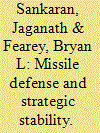| Srl | Item |
| 1 |
ID:
132001


|
|
|
|
|
| Publication |
2014.
|
| Summary/Abstract |
This article examines the merits of extending the U.S. nuclear deterrent to the Middle East. It begins by looking at past practices of such an extension before delving into the overall issues presented by providing such a security guarantee. This article then looks at a brief survey of some of the regional issues facing a nuclear extension before considering the P-5 states and their concerns.
|
|
|
|
|
|
|
|
|
|
|
|
|
|
|
|
| 2 |
ID:
156084


|
|
|
|
|
| Summary/Abstract |
South Korea is threatened by its troubled relationship with North Korea. North Korea possesses a large cache of missiles as well as chemical and biological weapons, and the future potential to mount nuclear weapons on its missiles. The United States is also challenged because of its defense commitments to Seoul. As a countermeasure, the United States and South Korea decided to deploy Terminal High Altitude Area Defense (THAAD) missile defenses in South Korea. However, China has objected. Chinese scholars believe the THAAD radar would be able to track Chinese inter-continental ballistic missiles, thereby weakening their deterrent. A technical analysis does not support this assertion. However, it is vital for South Korea, given its proximity and economic interdependence, to reassure China. South Korea should highlight that THAAD will be deployed by the United States Forces Korea and is not a commitment by Seoul to become part of U.S.-led missile defenses in the Asia-Pacific.
|
|
|
|
|
|
|
|
|
|
|
|
|
|
|
|
| 3 |
ID:
129669


|
|
|
|
|
| Publication |
2014.
|
| Summary/Abstract |
Tactical nuclear weapons have emerged as an unavoidable issue for future nuclear weapons negotiations between Russia and the United States. This article discusses challenges and opportunities regarding a tactical nuclear weapons treaty. It begins with an overview of precedents from the 1987 Intermediate Nuclear Forces Treaty and the 1991 Presidential Nuclear Initiatives. These and subsequent experiences show three major obstacles that must be overcome to permit bi-lateral agreement on tactical nuclear weapons: definitional issues over differentiating tactical from strategic nuclear weapons; negotiation challenges including the asymmetries between American and Russian tactical arsenals and non-nuclear capabilities such as ballistic missile defence and conventional prompt global strike; and verification questions over whether and how warhead status can be verified without disclosing sensitive information. This analysis examines whether the International Atomic Energy Agency could have a role in verification to help facilitate agreement. Lastly, this article offers various confidence building measures, emphasizing areas where the two countries could cooperate. While the obstacles are serious, there are opportunities for achieving consensus on some contentious issues.
|
|
|
|
|
|
|
|
|
|
|
|
|
|
|
|
| 4 |
ID:
150099


|
|
|
|
|
| Summary/Abstract |
Libya's nuclear program provides a relatively straightforward “closed case” that allows us to analyze the contribution of economic and diplomatic sanctions to nonproliferation efforts. While Libya endured substantial economic difficulties during the period when sanctions were in place, sanctions served mostly as a magnifier for these problems, rather than as a primary cause. However, we find that sanctions can be an effective nonproliferation tool when they: have multilateral support, exploit specific weaknesses in the target state's economy, take advantage of political shifts and divisions in the target state, and are used in combination with other tools.
|
|
|
|
|
|
|
|
|
|
|
|
|
|
|
|